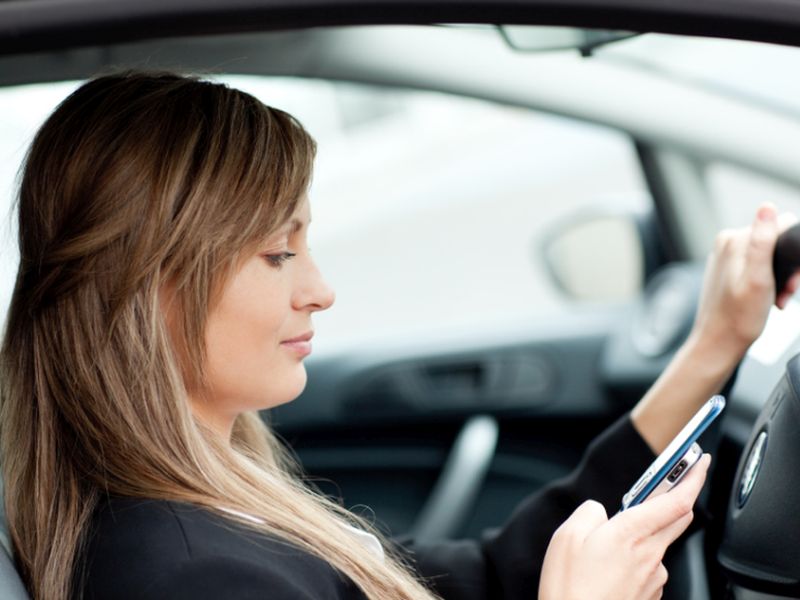2 of 3 Parents Read Texts While Driving
By Serena GordonHealthDay Reporter

MONDAY, May 13, 2019 (HealthDay News) -- Despite countless public service messages warning against texting and driving, more than two-thirds of parents have read a text while behind the wheel and roughly half have written a text while driving, a new survey finds.
Millennial parents were more likely to report distracted driving behaviors, such as reading a text. But both millennial parents (born between 1981 and 1996) and older parents wrote text messages behind the wheel at about the same rate. The study survey also found no significant differences in crash rates between the older and younger parents.
"Texting and driving is prevalent among all age groups. And, the uptick in the motor vehicle accident rates is thought to be due, in part, to distracted driving like texting," said study senior author Dr. Regan Bergmark. She is a surgeon at Brigham and Women's Hospital and an instructor in otolaryngology at Harvard Medical School in Boston.
Millennials tend to be more comfortable with technology compared with older generations. As more and more millennials become parents, the researchers wondered if their tech-savvy ways might prompt millennial parents to pick up their phones while driving more than older parents do.
For the study, the researchers asked 435 American parents to complete a distracted driving survey. Half of the parents were women. Eight out of 10 parents surveyed were white.
Fifty-two percent of those surveyed were millennials, average age 33. Forty-eight percent were older parents, average age 44. All had at least one child under the age of 14.
Parents were asked about the use of texts, emails, social media and maps while driving. They were also asked about how fast they were driving while performing these tasks. The more distracted driving behaviors parents said they did, the higher their likelihood of a crash.
Other findings included:
- 52% of millennials versus 57% of older parents said it was never safe to text and drive.
- 25% of millennials compared to 17% of older parents use an app or cellphone feature to reduce distracted driving.
- 16% of millennial parents versus 10% of older parents reported one or more auto accidents in the past year.
- Regardless of age, two-thirds of parents said they used their cellphones less when their child was in the car.
Fewer than one in four parents had been asked about texting and driving by the child's pediatrician, the study found. Slightly more millennial parents were asked about texting and driving.
And while safety was the researchers' paramount concern, Bergmark pointed out that parents are teaching a new generation that it's OK to text and drive. "It's important to recognize that kids are seeing what you're doing," she said.
Alex Epstein, director of transportation safety for the National Safety Council, was dismayed that so many parents were texting and driving.
"Why would you consider texting when you have that precious cargo onboard?" he said, adding that he agreed that parents are also teaching their kids to text and drive. "The moment they see you doing it, they'll end up modeling your behaviors."
Bergmark said it's also important to keep in mind that no matter how safe a driver you may be, because more and more people are driving distracted by phones or car displays, it's critical to make sure your eyes are on the road at all times.
"Two distracted drivers are more likely to cross paths now than in the past," she said.
In fact, the latest estimates from the U.S. National Highway Transportation Safety Administration say that nine people die every day from distracted driving.
Ideally, she said, people should turn their phones off while driving. But, she doesn't think that's likely to happen because people use their phones for directions and want to be reachable in an emergency.
So, what can be done?
"Phone apps can be helpful in limiting the unnecessary stuff. Turn off texting, and have an automatic response set that lets people know you're driving. We also need primary enforcement laws so that police can ticket just for cellphone use, and we need to be aggressive about that. Public service campaigns can help add to the stigma," Bergmark said.
Epstein added that there's "a tendency to believe it's the other guy's fault, but distraction is a national problem. There are lag times in your response any time your focus moves from the road to a device. There's no such thing as multitasking. We do one thing at a time well."
His advice? "Turn off electronic notifications when you're driving. People should just drive and stay fully engaged."
The findings were published as a letter in the May 13 online edition of JAMA Pediatrics.
More information
Learn more about distracted driving from the National Safety Council.

The news stories provided in Health News and our Health-E News Newsletter are a service of the nationally syndicated HealthDay® news and information company. Stories refer to national trends and breaking health news, and are not necessarily indicative of or always supported by our facility and providers. This information is provided for informational and educational purposes only, and is not intended to be a substitute for medical advice, diagnosis, or treatment.

